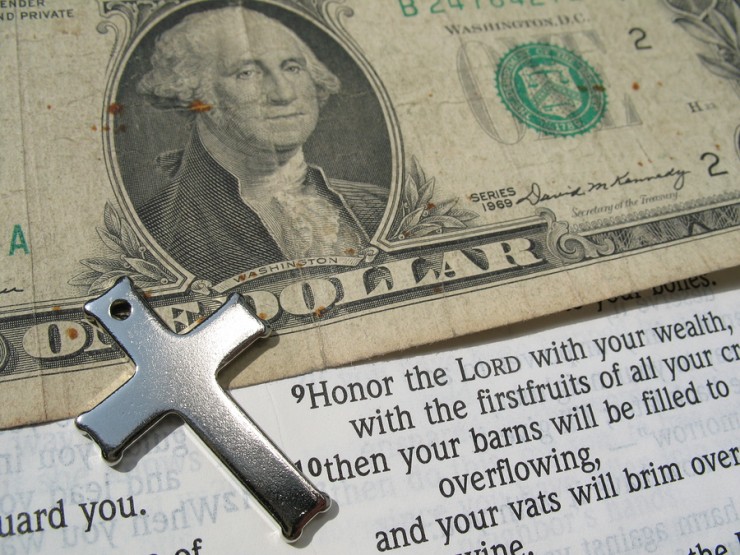I used to think only rich people could be obsessed with money. I saw how wrong I was when I began seeing signs money has become an idol in my own life.
I was actually more than $30,000 in debt when I was most obsessed with money. My intentions were good—I wanted to become debt-free. I wanted to protect my family by building an emergency savings. I wanted to give generously to my church. But I became so fixated with those goals that money turned into an idol, and I couldn’t even see it.
It was only through a loved one speaking into my life that I was able to wake up and realize I was on a slippery slope.
Read on for three signs money has become an idol in your own life…
Money is Constantly on Your Mind.
What do you think about when you first wake up? What’s on your mind just before you fall asleep? If your first and last thoughts of the day are centered on money—earning more, saving more, spending more or paying off more—it may be an idol. The Bible tells us we control our own thoughts, and we are to take every thought captive to make it obedient to Christ (2 Corinthians 10:5).
Keep an honest budget. Pay off your debt. Focus your attention on what matters.
Your Loved Ones Are Increasingly Frustrated With Your Money Talk.
Your family and close friends probably know you better than you think. If your spouse, children or friends look like they want to head for the hills when you bring up the subject of money (again), it may be an idol. Luke 6:45 says “the mouth speaks what the heart is full of” (NIV). A certain amount of money talk is healthy and necessary, but the subject shouldn’t come up every day. Don’t let an obsession with money damage or ruin a relationship.
You Have a “Destination” Mindset. Do The Following Thoughts Sound Familiar?
“If I can just get out of debt, I’ll be happy.”
“Once we have a fully-funded emergency savings, I’ll relax.”
“When I finally get that raise, everything will be perfect.”
“If I only have [fill in the blank]…”
This type of “destination thinking” is a lie. Here’s the reality: if your joy rests in achieving a particular financial goal, you’ll be disappointed every time. It’s human nature. Once we complete one goal, it won’t be long until a new one pops up. Some people live their entire lives climbing a ladder to nowhere. Just check out Solomon’s experience with this subject in the book of Ecclesiastes. If this wealthy, powerful king couldn’t find satisfaction through money, no one can. Ask God to help you find true contentment in Him. Nothing else will fully satisfy.
Financial idolatry is real, and it’s alive and well in America today. But recognizing it in our lives is half the battle, as well as the first step towards rooting it out.
Remember the wise words of Matthew 6, and be careful where you keep your treasure.
Stockpile treasure in heaven, where it’s safe from moth and rust and burglars. It’s obvious, isn’t it? The place where your treasure is, is the place you will most want to be, and end up being (The Message).
Actually, more than $30,000 in debt when I was most obsessed with money. My intentions were good—I wanted to become debt-free. I wanted to protect my family by building an emergency savings. I wanted to give generously to my church. But I became so fixated with those goals that money turned into an idol, and I couldn’t even see it.
It was only through a loved one speaking into my life that I was able to wake up and realize I was on a slippery slope.
Read on for three signs money has become an idol in your own life…
Money is Constantly on Your Mind.
What do you think about when you first wake up? What’s on your mind just before you fall asleep? If your first and last thoughts of the day are centered on money—earning more, saving more, spending more or paying off more—these may be signs money has become an idol. The Bible tells us we control our own thoughts, and we are to take every thought captive to make it obedient to Christ (2 Corinthians 10:5).
Your Loved Ones Are Increasingly Frustrated With Your Money Talk.
Your family and close friends probably know you better than you think. If your spouse, children or friends look like they want to head for the hills when you bring up the subject of money (again), it may be an idol. Luke 6:45 says “the mouth speaks what the heart is full of” (NIV). A certain amount of money talk is healthy and necessary, but the subject shouldn’t come up every day. Don’t let an obsession with money damage or ruin a relationship.
You Have a “Destination” Mindset. Do The Following Thoughts Sound Familiar?
“If I can just get out of debt, I’ll be happy.”
“Once we have a fully-funded emergency savings, I’ll relax.”
“When I finally get that raise, everything will be perfect.”
“If I only have [fill in the blank]…”
This type of “destination thinking” is a lie. Here’s the reality: if your joy rests in achieving a particular financial goal, you’ll be disappointed every time. It’s human nature. Once we complete one goal, it won’t be long until a new one pops up. Some people live their entire lives climbing a ladder to nowhere. Just check out Solomon’s experience with this subject in the book of Ecclesiastes. If this wealthy, powerful king couldn’t find satisfaction through money, no one can. Ask God to help you find true contentment in Him. Nothing else will fully satisfy.
Financial idolatry is real, and it’s alive and well in America today. But recognizing it in our lives is half the battle, as well as the first step towards rooting it out.
Remember the wise words of Matthew 6, and be careful where you keep your treasure.
Stockpile treasure in heaven, where it’s safe from moth and rust and burglars. It’s obvious, isn’t it? The place where your treasure is, is the place you will most want to be, and end up being (The Message).
 The Bible says, “If anyone, then, knows the good they ought to do and doesn’t do it, it is sin for them” (James 4:17, NIV). It’s impossible to out-give God. Whether you barely give at all or steadily contribute tithes and offerings, talk to God about areas where you’re holding back. Repent, and ask God to help you to be a faithful, cheerful giver. Continue reading
The Bible says, “If anyone, then, knows the good they ought to do and doesn’t do it, it is sin for them” (James 4:17, NIV). It’s impossible to out-give God. Whether you barely give at all or steadily contribute tithes and offerings, talk to God about areas where you’re holding back. Repent, and ask God to help you to be a faithful, cheerful giver. Continue reading














